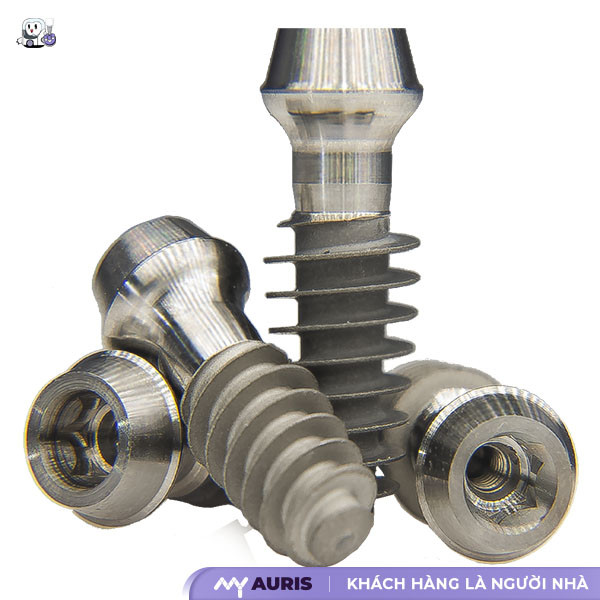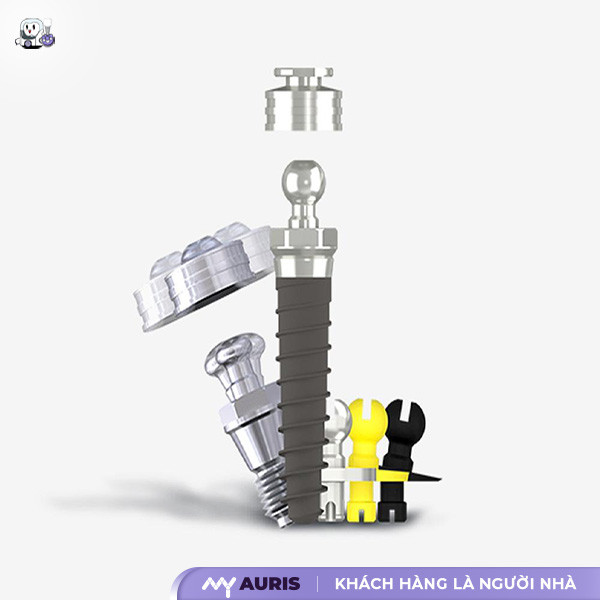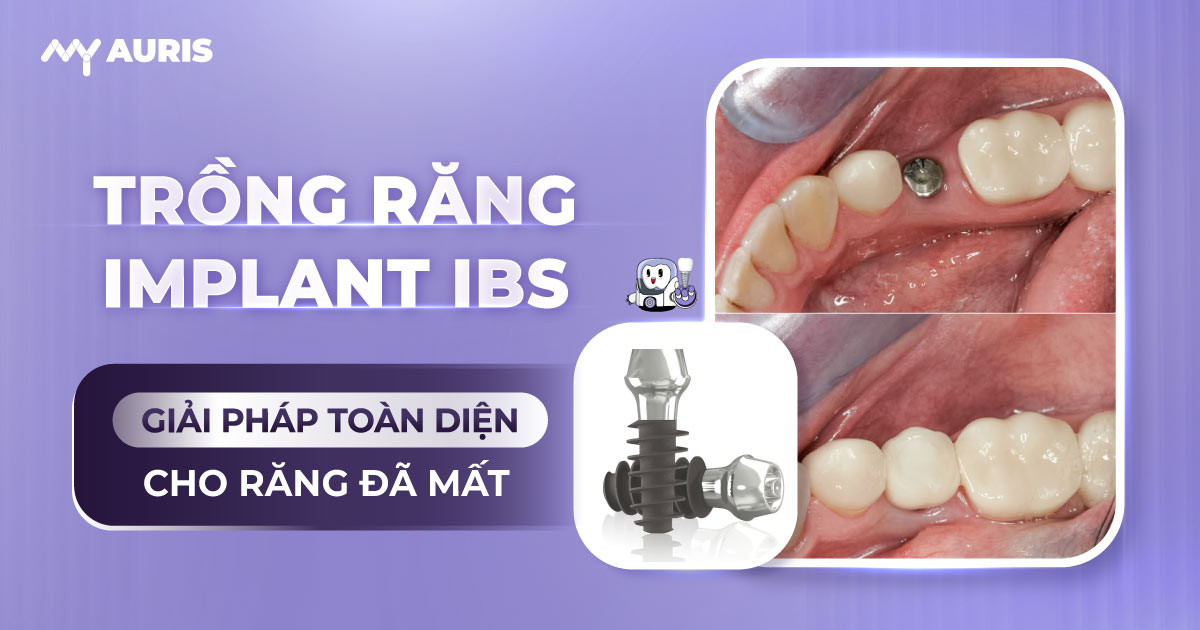Are you looking for a permanent tooth restoration solution? IBS dental implants might be the optimal choice. However, the cost of IBS dental implants is a concern for many clients. This article will analyze the factors influencing the cost, helping you better prepare for dental surgery.
What Factors Influence the Cost of IBS Dental Implants?
Currently, the cost of a single dental implant (also known as a 1-tooth implant) typically ranges from 13,000,000 VND/tooth to 35,000,000 VND/tooth. This price variation depends on numerous factors such as the dentist’s expertise, implant technology, the brand of the implant post, and the dental clinic performing the procedure. Therefore, patients should research carefully and choose reputable clinics with highly skilled teams to ensure long-term effectiveness and maximum safety.
Factors Determining the Cost:
Number of IBS implants required: Losing one tooth will cost less than losing multiple teeth. Full-arch dental treatment with IBS implants requires more implants, hence a higher cost.
Implant Material: Genuine IBS implants, made from Titanium, come in various types with different price points. The IBS implant price list will depend on the material, size, shape, special surface coating, and exclusive connection design of each type.
Abutment and Dental Crown: The abutment connects the implant to the dental crown. The material used for the abutment (Titanium or ceramic) and the type of dental crown (metal, porcelain, or all-ceramic) affect the cost.
Jawbone and Gum Condition: If the jawbone is weak, bone grafting is required before IBS dental implant placement. Bone grafting and gum grafting increase the treatment cost.
Reputable Implant Clinic: A reputable clinic with skilled implantologists, modern equipment, and advanced dental technology typically incurs higher costs. However, this ensures treatment quality and minimizes complications after IBS dental implant placement. IBS dental implant restoration is a long-term investment in oral health and smile aesthetics.
Accompanying Services: Dental X-rays, conservative dental treatments, tooth extractions, removable dentures, etc. These services incur additional costs.

How is the IBS Dental Implant Procedure Performed?
Step 1: Initial Examination and Consultation (Duration: 30-60 minutes)
The dentist conducts a comprehensive oral health examination, takes dental X-rays, and assesses the condition of the jawbone and gums. Based on the results, the dentist advises on suitable treatment options, explains the advantages and disadvantages of dental implants, the IBS implant price list, and answers all client questions. This step is crucial, helping clients understand the procedure, dental implant costs, and choose the right solution.
Step 2: Detailed Treatment Planning (Duration: 1-2 days)
After the client agrees to the treatment plan, the dentist creates a detailed plan, including the type of genuine IBS implant, size, placement location, abutment material, and dental crown. The dentist uses modern dental technology such as 3D design software to simulate the implant placement procedure, ensuring precision and treatment effectiveness.
Step 3: Implant Placement Surgery (Duration: 60-90 minutes)
IBS dental implant surgery is performed in a sterile environment. The dentist administers local anesthesia, then places the IBS implant into the jawbone. IBS’s special thread design and exclusive manufacturing material help the implant integrate well with the jawbone. After surgery, the dentist will stitch the incision and provide post-implant care instructions.
Step 4: Abutment and Dental Crown Placement (Duration: 30-60 minutes/appointment)
After the implant has fully integrated with the jawbone (typically several months), the dentist attaches the abutment – the connecting part between the implant and the dental crown. Finally, the dental crown is placed onto the abutment, completing the restoration process. The dental crown is crafted to match natural teeth in color and shape, ensuring aesthetics and chewing function.
Step 5: Follow-up and Regular Care (Frequency: every 3-6 months)
Oral care after IBS dental implant placement is crucial to ensure durability and longevity. The dentist will schedule regular follow-up appointments to check the condition of the implant and gums and provide instructions on home implant care. Adhering to the dentist’s instructions helps minimize complications after IBS dental implant placement.

Are IBS Implants Good?
A dental implant consists of 3 parts: Titanium, Abutment, and dental crown. IBS implants, with their special thread design and exclusive manufacturing material, integrate well with the jawbone and gums. This provides stability and strength, allowing you to chew comfortably like natural teeth. The high aesthetic appeal of IBS implants helps you feel confident with a radiant smile.
Made from pure Titanium, IBS implants have high biocompatibility, minimizing complications after dental implant placement. Titanium is also renowned for its durability, ensuring a long implant lifespan. IBS’s strict quality control process further affirms the product’s quality and reliability.
IBS implants utilize advanced manufacturing technology, a special surface coating, and an exclusive connection design. These factors optimize the bone integration process, shorten treatment time, and enhance proven clinical efficacy.
Compared to other dental implant types in the dental market, IBS implants offer a competitive price. The IBS implant price list depends on each reputable implant clinic and the client’s oral condition. However, with superior quality, durability, and aesthetics, IBS implants are a worthwhile investment for overall and oral health.

My Auris Dental Clinic: A Reputable Address for Dental Implants
Tooth loss significantly affects aesthetics, chewing function, and overall health. IBS dental implant restoration is the optimal solution. IBS implants, with their special thread design and exclusive Titanium manufacturing material, integrate perfectly with the jawbone, creating a stable foundation for the dental crown. The result is durable, beautiful, natural-looking teeth, improving the quality of life.
My Auris Dental Clinic proudly stands as a reputable dental implant clinic, providing high-quality IBS dental implant services. Our team of skilled and experienced implantologists, combined with advanced dental technology, ensures a safe and effective implant placement procedure. My Auris is committed to delivering a comfortable and gentle dental treatment experience for all clients.
Why Choose My Auris Dental Clinic
Highly Skilled Dentists: A team of expert implantologists, thoroughly trained in dental surgery, conservative dental treatment, and regenerative medicine.
Modern Technology: Application of dental X-ray technology, dental surgery, and advanced IBS manufacturing technology, ensuring precision and safety.
Genuine Materials: Use of genuine IBS dental implants, high-quality abutments, and dental crowns, ensuring durability, longevity, and aesthetics.
Dedicated Care: A devoted and attentive staff, providing thorough post-implant care instructions, helping clients maintain long-term oral health.
Reasonable Costs: Transparent and competitive IBS implant price list in the dental market.
Things to Note After IBS Dental Implant Treatment
You have just completed IBS dental implant surgery. The journey to a new smile has just begun. Proper oral care after treatment is a decisive factor in the success, durability, and longevity of your IBS implant. Let’s explore important guidelines to ensure a smooth and effective recovery process.
First Week – The Critical Period
Immediately after dental surgery, you may experience some discomfort. This is normal. Apply ice to the outside of your cheek for about 20 minutes, rest for 20 minutes, and repeat for the first few hours to reduce swelling. Take medication as prescribed by the dentist. Avoid vigorous rinsing, spitting, or touching the treated area. Eat soft, liquid, cool foods. Limit chewing in the IBS dental implant area. Avoid smoking and alcohol consumption. These factors affect the healing process and jawbone.
Oral Hygiene – Key to Success
Thorough oral hygiene is mandatory. Use a soft-bristled toothbrush to gently brush other teeth. Rinse with physiological saline or a solution prescribed by the dentist. Use dental floss carefully around the IBS implant area, avoiding direct contact with the implant. Successful dental treatment depends on maintaining good oral hygiene.
Diet – Supporting Recovery
During the first few weeks, choose soft, easy-to-chew foods like soup, porridge, and smoothies. Avoid hard, chewy, hot, or spicy foods. Drink plenty of water. Adequate nutrition helps the body recover quickly and supports the regenerative medicine process.
Regular Check-ups – Ensuring Long-Term Results
Following up with scheduled dental appointments is very important. The dentist will check the recovery status, make adjustments if necessary, and provide oral care instructions. Regular check-ups help detect and address any complications after IBS dental implant placement promptly, ensuring the long-term success of this tooth restoration solution.





